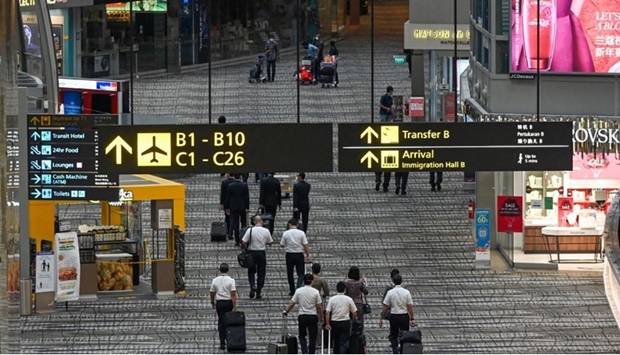Singapore will lift restrictions for all vaccinated travellers from next week, with Prime Minister Lee Hsien Loong on Thursday hailing it as a "major milestone" in the aviation hub's efforts to live with Covid-19.
The city-state is the latest Asian country to ease travel restrictions in a region that has generally been more reluctant to lift barriers than Europe and North America.
A gateway for many travellers arriving in the Asia-Pacific, Singapore had already started quarantine-free travel schemes with some countries in recent months.
From April 1, fully vaccinated adults and unvaccinated children will be allowed to enter the country without quarantining, as long as they take a pre-departure test, officials said.
Lee said Singapore had reached a "major milestone" in its efforts to live with the virus.
Easing travel curbs will "reconnect Singapore with the world," he said in a televised address.
"It will give a much-needed boost to businesses, particularly the tourism sector, and it will help Singapore reclaim its position as a business and aviation hub."
Only travellers on a "restricted list" will face curbs in entering Singapore, although there are currently no countries on the list.
A raft of other coronavirus measures were also eased, with people in Singapore no longer required to wear masks outside, and limits on group sizes raised to 10, up from five previously.
At the start of the pandemic, the country of 5.5 million kept Covid-19 cases low through border closures and a tough lockdown.
It has faced sizeable outbreaks since last year and, with some of the world's highest vaccination rates, authorities have shifted to a policy of living with the virus.
The pandemic plunged Singapore into its worst-ever recession in 2020 as the trading hub closed its borders.
International visitor arrivals dropped to just 2.7 million that year from more than 19 million in 2019.
Singapore's approach stands in contrast to rival financial hub Hong Kong, where arrivals are still required to undergo lengthy quarantines in hotels.
Following Singapore's announcement, Hong Kong leader Carrie Lam was forced to defend her administration's approach, insisting the Chinese city remained an "attractive" financial centre.
"The policies and measures to be adopted by each government in combating Covid differ," she said.
Like mainland China, Hong Kong has stuck to a zero-Covid policy, but the approach has led to an exodus of foreign and local residents, and failed to stop a fierce Omicron outbreak in recent months.
Other countries in the Asia-Pacific that have recently announced an easing of travel restrictions include Australia, New Zealand, Indonesia and Malaysia.

